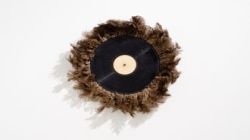
Efrat Natan / Mיret Oppenheim
Efrat Natan
Born on Kibbutz Kfar Rupin, 1947
Lives and works in Tel Aviv
Mיret Oppenheim inspired Efrat Natan's combination of readymade objects and other materials. In her record works from the late 1990s, for instance, one record is ornamented with hairpins, while another record is surrounded by feathers and charged with a fur-like, erotic quality. The hairpins conjure up the way Natan's mother wore her hair, and allude simultaneously to beauty and to the pain of being pricked. The bunny rabbits made of undershirts are part of Work on Roof (1979). Their reincarnation in another work from 1995 thus brings together vestiges of, and allusions to, earlier works by Natan herself, alongside a reference to Michal Na'aman's famous rabbits/ducks. Indeed, this work is shaped as a series of humorous tributes to Michal Na'aman, while Mיret Oppenheim's spirit hovers above them.
Mיret Oppenheim
1913, Berlin, Germany
1985, Basel, Switzerland
In 1936, Mיret Oppenheim created her famous work Breakfast in Fur - a cup, spoon, and saucer covered in gazelle fur. This work, which was exhibited the same year at the Museum of Modern Art in New York and acquired for the museum collection, is still considered a quintessential example of a Surrealist art object. The fur-covered dishes are one of the first representations of female sexuality from a woman's point of view, while alluding to clichיs of femininity and sexuality.
Mיret Oppenheim became acquainted with members of the Surrealist group when she arrived in Paris at the age of 18. From the chauvinist perspective of her male colleagues, she was not only an artist, but also, perhaps most importantly, the "Surrealist woman" - a beautiful, mysterious figure and a sought-after model for photographs (by Man Ray, among others). In 1975, she summed up her insights in the following sentence: "Freedom is not something you are given, but something you have to take."